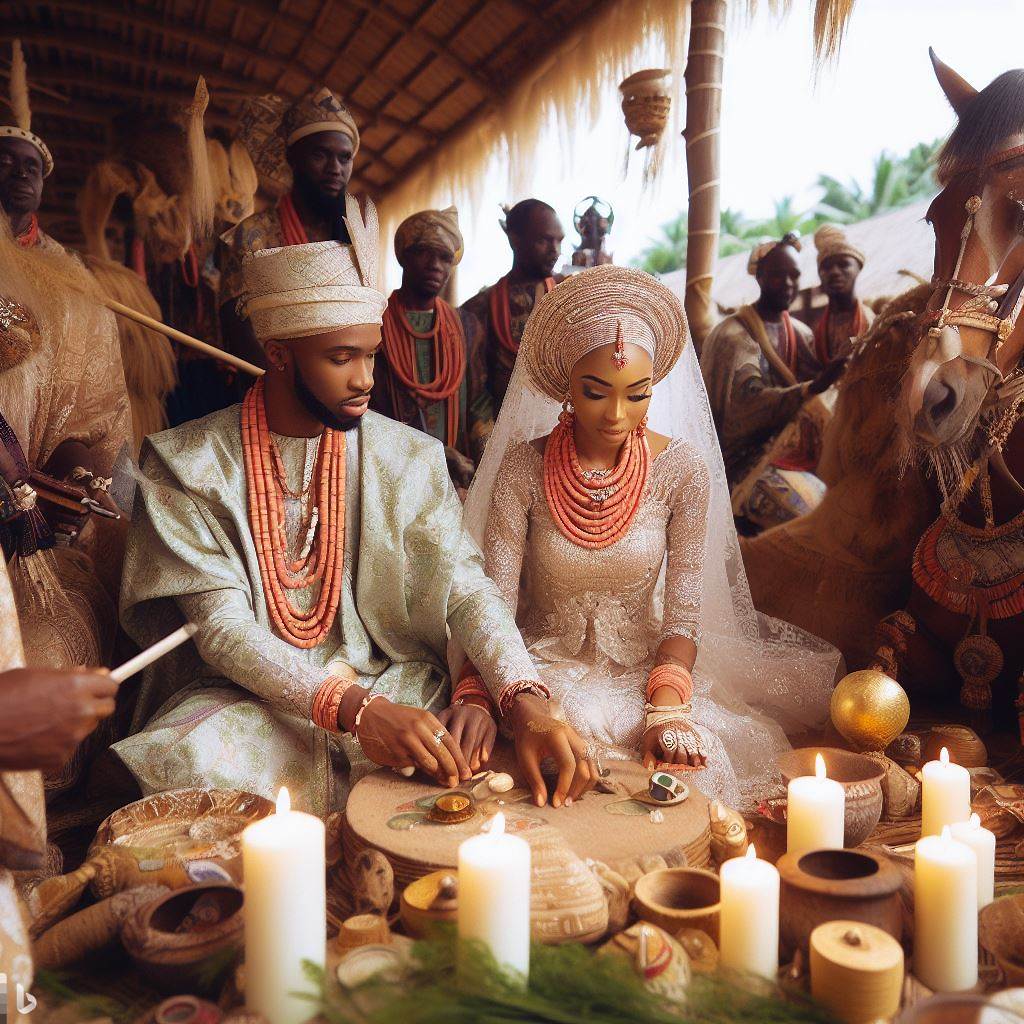Introduction
Polygamy is a common practice in Nigeria, involving multiple spouses in a marriage.
Polygamous marriages face various challenges that stem from the need to balance love and respect.
Polygamy has long been a significant aspect of Nigerian culture, with many men having multiple wives and forming polygamous marriages.
These marriages, though culturally accepted, are not without their challenges and complexities.
One of the key challenges in polygamous marriages is the struggle to balance love and respect among the spouses.
When a man has multiple wives, it becomes difficult to ensure that each wife receives an equal amount of love and attention.
This can lead to feelings of jealousy, insecurity, and neglect among the wives.
Furthermore, the practice of polygamy often results in unequal power dynamics within the marriage.
The first wife, for instance, may hold more influence and authority compared to subsequent wives.
This imbalance can create a sense of competition and resentment among the wives, ultimately impacting the harmony of the family unit.
In addition to these emotional challenges, polygamy also poses financial strains on the husband.
Having multiple wives means providing for multiple households, which can be financially burdening.
This may result in a lack of resources and support for all the wives and their children, making it difficult to maintain a stable and secure family environment.
Overall, polygamous marriages in Nigeria face numerous challenges in striking a balance between love and respect.
The need for fairness, equality, and effective communication becomes crucial for the success and harmony of such relationships.
Without addressing these challenges, the complexity of polygamy can ultimately lead to dissatisfaction, conflict, and the breakdown of the family unit.
Read: Marriage Toast Etiquette: Ensuring Respect & Warmth
Understanding Polygamy in Nigeria
Definition and historical context of polygamy
- Polygamy refers to a marriage system in which an individual has multiple spouses simultaneously.
- In Nigeria, polygamy has a long history and is deeply rooted in cultural and traditional practices.
- It is not uncommon for Nigerian men to have more than one wife, and it is considered a symbol of wealth and status.
- In the past, polygamy was prevalent among the ruling elite and served as a means to forge alliances and strengthen political ties.
- While polygamy is more common in rural areas, it is still practiced to some extent in urban areas as well.
- Historically, Nigerian society has accepted and even promoted polygamy as a way of building strong family structures.
Cultural and religious perspectives on polygamy in Nigeria
- Polygamy is ingrained in Nigerian culture, often seen as a means to ensure family prosperity and lineage continuity.
- Religious influences vary; Islam permits polygamy with conditions, while Christianity generally discourages it.
- Despite acceptance, challenges arise within polygamous marriages, including issues of love, respect, and jealousy.
- Children may grapple with identity and belongingness in complex family dynamics.
- Financial constraints and resource allocation strain relationships among wives.
- Polygamy can perpetuate gender inequalities and limit women’s rights and autonomy.
- Recognizing the cultural and historical context is essential in addressing polygamy’s challenges in Nigerian society.
Read: Infusing Pidgin English into Your Nigerian Wedding Toast
The Challenges Faced in Polygamous Marriages
Jealousy and rivalry among co-wives
- Lack of emotional support and bonding
- Competition for resources and attention from the husband
Communication issues and power dynamics
- Difficulty in effective communication among multiple spouses
- Imbalances in decision-making and authority
Emotional burden on the husband
- Polygamous marriages pose challenges, including jealousy and rivalry among co-wives.
- Emotional support lacks due to multiple wives, leading to insecurity and emotional voids.
- Competition for resources fuels tensions and feelings of neglect among wives.
- Communication is strained, requiring substantial effort and attention from all parties.
- Power imbalances result in conflicts, marginalizing some wives and causing dissatisfaction.
- Husbands face pressure meeting diverse needs, leading to emotional exhaustion and stress.
- Managing conflicts and ensuring fairness demands significant effort and emotional intelligence.
Polygamous marriages necessitate open communication, empathy, and commitment to harmony for resolution.
Read: Dos and Don’ts: Giving a Toast at Nigerian Weddings

Balancing Love and Respect in Polygamous Marriages
Cultivating love and emotional support among co-wives
- Develop empathy and understanding between co-wives by acknowledging their individual experiences.
- Encourage open communication and conflict resolution to address any issues or misunderstandings that may arise.
Fostering mutual respect and equal treatment
- Establish clear expectations and boundaries to ensure that each wife feels valued and respected.
- Promote fairness and justice in decision-making, giving each wife an equal voice and considering her opinions.
The importance of individual and collective well-being
- Encourage self-care and self-esteem among wives to maintain personal happiness and fulfillment.
- Create a harmonious, supportive environment, prioritizing the well-being and happiness of the entire family.
In polygamous marriages, balancing love and respect is vital for a healthy and fulfilling relationship.
It requires cultivating love and emotional support among co-wives through:
- Developing empathy and understanding, recognizing individual differences.
- Promoting open communication and conflict resolution to minimize misunderstandings.
- Establishing clear expectations, boundaries, and mutual respect.
- Ensuring fairness and justice in decision-making, involving all wives.
- Emphasizing the importance of individual and collective well-being, encouraging self-care and self-esteem.
By actively practicing these principles, polygamous marriages can overcome challenges and thrive in an environment of love and respect.
Read: Inspirational Quotes for Crafting Your Marriage Toast
Conclusion
After exploring the challenges of polygamy, it is clear that maintaining successful polygamous unions requires a delicate balance of love and respect.
Throughout this blog section, we have discussed the various hurdles faced by individuals in polygamous marriages.
These challenges can include jealousy, insecurity, and the struggle to divide time and attention among multiple partners.
To overcome these challenges, love and respect are vital.
Each partner must approach the relationship with a genuine desire to build emotional connections and support one another.
Without love, a polygamous union would be doomed to fail, as it lacks the necessary foundation for growth and sustainability.
Furthermore, respect is key in ensuring that all partners feel valued and heard within the relationship.
Open communication and a willingness to address concerns and boundaries are essential components of a successful polygamous union.
By actively demonstrating respect for each partner’s autonomy and individuality, conflicts can be minimized, and trust can be fostered.
In review, polygamous relationships have the potential for growth and transformation.
While navigating the challenges of sharing love and maintaining balance may seem overwhelming, it is through these difficulties that personal development can flourish.
Polygamy pushes individuals to introspectively analyze their own desires, insecurities, and emotional patterns.
With a commitment to love, respect, and open communication, polygamous relationships can thrive, creating a fulfilling and harmonious union for all involved.




